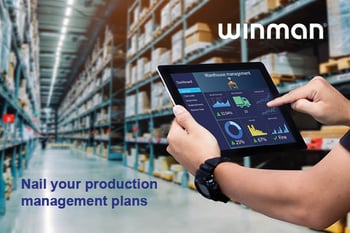The rate of change is ever adapting in the food processing industries due to varying consumer trends and innovative advancements paving the way for new, sustainable products
Food manufacturing businesses should be seriously considering cross-functional software solutions to improve both their offering and operational efficiency.
Explore why food processing businesses should consider digital solutions as well as the varying operational requirements such digital solutions can enhance.
Why do I need a digital solution?
There are several processes, standards and responsibilities that businesses within the food industries must oversee. Managing these requirements simultaneously can become challenging and time-consuming – especially when it comes to reviewing and needing to update them to keep up to date with new industry advancements. Enterprise resource planning, or ERP software helps food processing operations to enhance interdepartmental collaboration and boost productivity. ERP software is a business management tool which helps you to integrate all departments, giving them one system to use, centralising their data and giving you access to real-time information, as well as giving you the power to automate repetitive workflows. Enabling and leading to more streamlined and faster operations.
Here are three ways a digital ERP solution can help your food processing business:
- Planning and scheduling
ERP systems provide better traceability so that food manufacturers can accurately track, plan and schedule activities. They can use the software to determine how long it takes for each operator to complete a processing stage so they can make changes, offer training or hire new team members where necessary. Integrated ERP solutions also make it easier to determine how many raw materials are necessary for future projects based on previously logged data.
Implementing an ERP is all about process optimisation, helping you to alleviate bottlenecks, by applying lean manufacturing techniques into your processes, supported by user-friendly software where your teams can use functionality and interfaces which drop-and-drag work cells to move, change or adjust business-wide tasks quickly and facilitate new schedule requirements.
- Inventory management solutions
Inventory management solutions provide real-time information in relation to your supply chain operations, inventory investments, current stock and product sales. Food professionals can see how much product, or raw materials, have been used and quickly access recipes, or structures that combine material with the process, and make changes or updates to the manufacturing flow as required. ERP inventory management tools also help you to store and locate items. You can ensure processed food products are stored in the right way, avoid cross-contamination or allergens and facilitate quicker packing and distribution operations.
In addition, inventory management helps when it comes to arranging items. You can arrange them by date, order of use, weight, size or popularity. This helps combat the occurrence of expired items. Where a product or material is running low, inventory software will flag this to you identifying low levels and automatically notify suppliers or trigger manufacturing.
- Batch processing management
Batch processing involves recording each process or task within a project to determine its total output requirements. In the food industry, this method means that food professionals can scale up and manage mass production. Processes which could help might include separate cooking tasks in order of their requirement, for example picking raw materials from stores, then moving on to mass cutting before moving on to mass blending, mixing or cooking. Batch processing systems are designed to record the time taken to complete each activity and utilise pre-determined bills of materials (BoMs) to ensure the right volume, scaled-up timings and resources are allocated to delivering the production of the required batch on time. Formulas, recipes and specifications can all be stored against an item for reference. High-cost or dangerous items can be ring-fenced in the system and held within special-access physical stores, as a ‘restricted access’ item so that only supervisors or management can have access to it prior to use.
When integrating ERP software and optimising processes across your food, or any other manufacturing, operation – you unlock the ability to also implement a range of shop floor apps to make live data entry quicker. A range of apps are available to simplify processes, streamline workflows and perform manual data entry heavy tasks, some examples include generating invoices, conversing with customers and creating shipping slips. Apps are used across many manufacturing and distribution environments via handheld or portable mobile devices.
To learn more, get in touch with WinMan today, to build, learn and grow with a cloud-based or on-premise ERP system which helps you to optimise your process.
Discover all the features within the WinMan software here:




.png?width=120&height=120&name=MicrosoftTeams-image%20(4).png)


